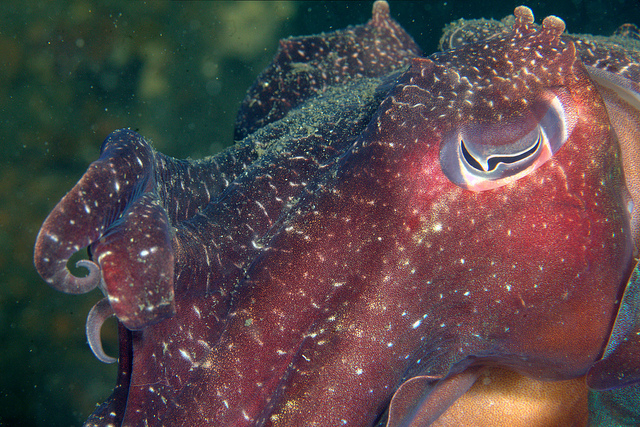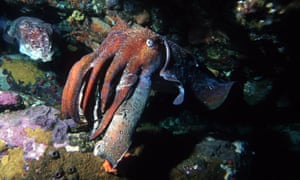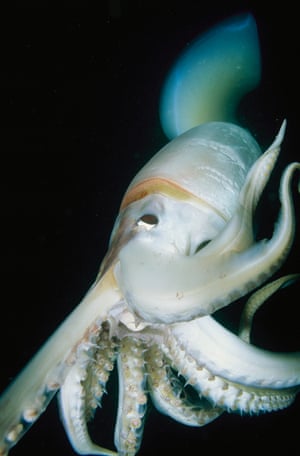http://e-info.org.tw/node/115627
魷魚、烏賊、章魚大爆發 研究:頭足類更能適應暖化
文字大小
285 1 Share1
本報2016年5月27日綜合外電報導,姜唯編譯;蔡麗伶審校
過去60年因人類活動影響,海洋嚴重暖化、魚群大量減少。科學家卻意外發現,魷魚、烏賊、章魚卻越發欣欣向榮,比其他海洋動物更能適應環境變遷。
科學家發現,頭足類生物因繁殖快速,可能比長壽的動物更具優勢。圖片來源:PacificKlaus(CC BY-NC 2.0)。
海洋界的明日之星:烏賊、魷魚、章魚
國際研究團隊建立起頭足類捕撈量的資料庫,發現儘管繁殖方式多元,有些在海床上產卵和生活,有些則是在海中四處移動,但幾乎全世界的頭足類都穩定增加。
「頭足類生活步調快、死得早,可說是海洋裡的搖滾明星。」研究主持人、阿德雷德大學海洋生物學家吉爾廉德(Bronwyn Gillanders)說,頭足類繁殖快速的特性,可能比長壽的動物更具優勢。
另一位作者達博岱(Zoe Doubleday)則形容頭足類是「海中的小草」,因為長得快、壽命短,而且發展很有彈性,比其他海洋動物更能適應環境變遷。
研究團隊原本是要調查澳洲巨型烏賊(giant Australian cuttlefish)數量減少的現象。澳洲巨型烏賊可以長到20吋長、23磅重,公烏賊可改變體色,悄悄趕過情敵,和母烏賊交配。
「調查出乎意料地揭露,頭足類正在快速增加。」達博岱說。
科學家:或有負面效應 水母暴增即為一例
魚類和珊瑚礁都因為過度捕撈和氣候變遷而快速減少。近期研究發現,全球漁獲量減少速度比聯合國的統計還快三倍,全球暖化將導致魚群減少1/4,而且93%的大堡礁將因暖化而白化。
不過,過度捕撈和海洋暖化可能反而有利章魚、魷魚和烏賊生存。頭足類是貪婪的食肉動物,過度捕撈導致牠們的競爭者和天敵皆減少。在糧食仍足夠、溫度沒有上升太過劇烈的情況下,暖化的海水會加速頭足類的生命週期。
吉爾廉德指出,1997至1998年的聖嬰和反聖嬰現象後,太平洋溫暖的海水讓墨西哥、秘魯和智利外海的洪堡魷魚(又稱大赤魷)數量異常大增。十多年後,這種長壽的魷魚生活範圍北移了100英里,適應了2009年至2010年的聖嬰現象。其他魷魚則往更外海移動,並提早開始繁殖。
不過研究人員也警告,這種族群動態非常難以預測,人類活動可能在頭足類身上產生不良的效應。
海洋酸化使水母暴增,就是人類自食惡果。水母可以生活在充滿農業廢水和漏油污染的海水中,適應力強,近年數量激增,影響船隻航行甚至使核電廠被迫關閉。
【相關文章】
【參考資料】
Squids and octopuses thrive as 'weeds of the sea' warm to hotter oceans
Squid, cuttlefish and their relatives appear to benefit from ‘live fast, die young’ mentality as study shows cephalopods have thrived over past 60 years
Octopuses, cuttlefish and squid have thrived in the world’s oceans over the last 60 years despite – or because of – human activity that has warmed oceans and reduced fish populations.
An international team compiled a database of cephalopod catch rates, and found that even though the creatures reproduce in diverse ways – some hatch and live near the sea floor, others are born and die moving up and down the water column – around the world, nearly all are steadily increasing.
“Cephalopods have this ‘live fast, die young’ life history strategy – the rock stars of the sea, if you like to call them that,” Bronwyn Gillanders, the project leader and a marine biologist at the University of Adelaide, told the Guardian.
Her colleague and the lead author of a study released on Monday, Zoe Doubleday, had a different analogy.
“Cephalopods are often called ‘weeds of the sea’,” she said, because their “rapid growth, short lifespans and flexible development” let them adapt to environmental changes more quickly than other marine animals.
This rapid life cycle, Gillanders said, means cephalopods can “proliferate quickly, perhaps with advantages over longer-lived organisms”.
Gillanders and her colleagues published their findings on Monday in the journalCurrent Biology. The research began when the Adelaide team began investigating the decline of the giant Australian cuttlefish, a species that can grow to 20in and 23lb and whose males use color mimicry and deceit to sneak past competitors for a mate.
“Surprisingly, analyses revealed that cephalopods as a whole are in fact increasing,” Doubleday said, “and since this study, cuttlefish numbers from this iconic population near Whyalla are luckily bouncing back.”
Fish populations and coral reefs are declining rapidly due to overfishing and climate change. Recent studies have found that global fish catches arefalling three times faster than official United Nations figures suggest, predicted that global warming willshrink fish populations by a quarter, and said bleaching by warm oceans hasaffected 93% of the Great Barrier Reef.
Yet overfishing and warming oceans may benefit octopuses, squid and cuttlefish. Cephalopods are voracious predators, for which overfishing depletes competition and removes predators. Warmer waters are believed to accelerate cephalopod life cycles, so long as food remains available and the temperatures do not rise too far.
Gillanders noted that after the El Niño and La Niña phenomena of 1997-98, for instance, warm Pacific waters apparently affected whole populations of Humboldt squid (also known as jumbo flying squid): unusually large Humboldts were found in large numbers swimming off Mexico, Peru and Chile.
The squid, which live longer than most other squid (two years, rather than one), can grow to nearly 5ft: after El Niño, they were found weighing between 25lb and 88lb.
More than a decade later, the long-lived squid were found to have adapted to the 2009-10 El Niño by moving 100 miles north of their usual territory. Others moved into the open ocean and began breeding much earlier than normal.
“These traits allow them to adapt readily to changing environmental conditions,” Gillander said. “They may therefore have a competitive advantage over longer-lived, slower-growing species.”
The researchers warned, however, that the “population dynamics are notoriously difficult to predict”, and “human activities may have a deleterious effect on cephalopod populations”.
The acidification of oceans, for example, has proven damaging for most marine life save jellyfish, which may also be reaping rewards from what humans have sown.
Jellyfish can survive in waters polluted by runoff and oil spills, adapt well to new environments, and have bloomed in such vast numbers in recent years that they have stopped ships and shut down nuclear plants.




沒有留言:
張貼留言